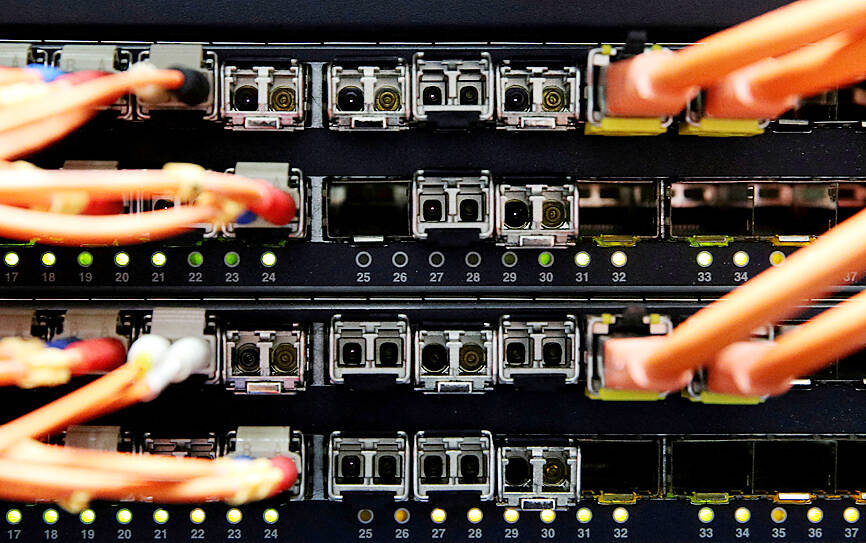The Executive Yuan yesterday passed a four-year, NT$1.34 billion (US$41.86 million) plan to reinforce the nation’s digital resilience.
The Ministry of Digital Affairs said that the government’s digital resilience project would reinforce fixed telecommunications networks to process encrypted data on public cloud servers during peacetime, and use satellites and mobile communication networks to access critical core functions on the public cloud.
Premier Chen Chien-jen (陳建仁) told a meeting of the Executive Yuan that the project would help realize President Tsai Ing-wen’s (蔡英文) goal to build a more resilient nation, which she first promised in her Double Ten National Day address last year.

Photo: Reuters
The project would utilize cross-sector public cloud computing to encrypt and back up information generated by 18 critical civilian systems, forming a vital core that would allow the government to maintain essential digital services in an emergency, Chen said.
The project would also hasten the government’s return to functionality in the event of a disaster, he said.
Taiwan is racing against time, as global affairs are changing by the second, he said, adding that ministries should prioritize transfers of critical civilian systems to the cloud.
The digital ministry should provide assistance and programs for local governments and ministries to train sufficient personnel with the skills to enhance Taiwan’s digital resilience, Chen said.
Separately, Deputy Minister of Digital Affairs Chiueh Her-ming (闕河鳴) said that the ministry wants to keep some systems — such as those utilized by the National Health Insurance, the Ministry of Transportation and Communications’ vehicle management system and the Ministry of the Interior’s border control systems — running in the event of natural disasters.
The digital ministry encrypts and stores data in “blocks” separately on public-domain cloud servers, Chiueh said, adding that the system is “mathematically sound,” although information security cannot be 100 percent.
This method ensures that even if individuals were to somehow obtain part of the information, it would be meaningless, he said.
The decision to implement the system was made with the evolution of cryptography in mind and that the system is a low-risk way to store information, he added.
Additional reporting by CNA

‘DANGEROUS GAME’: Legislative Yuan budget cuts have already become a point of discussion for Democrats and Republicans in Washington, Elbridge Colby said Taiwan’s fall to China “would be a disaster for American interests” and Taipei must raise defense spending to deter Beijing, US President Donald Trump’s pick to lead Pentagon policy, Elbridge Colby, said on Tuesday during his US Senate confirmation hearing. The nominee for US undersecretary of defense for policy told the Armed Services Committee that Washington needs to motivate Taiwan to avoid a conflict with China and that he is “profoundly disturbed” about its perceived reluctance to raise defense spending closer to 10 percent of GDP. Colby, a China hawk who also served in the Pentagon in Trump’s first team,

SEPARATE: The MAC rebutted Beijing’s claim that Taiwan is China’s province, asserting that UN Resolution 2758 neither mentions Taiwan nor grants the PRC authority over it The “status quo” of democratic Taiwan and autocratic China not belonging to each other has long been recognized by the international community, the Mainland Affairs Council (MAC) said yesterday in its rebuttal of Beijing’s claim that Taiwan can only be represented in the UN as “Taiwan, Province of China.” Chinese Minister of Foreign Affairs Wang Yi (王毅) yesterday at a news conference of the third session at the 14th National People’s Congress said that Taiwan can only be referred to as “Taiwan, Province of China” at the UN. Taiwan is an inseparable part of Chinese territory, which is not only history but

CROSSED A LINE: While entertainers working in China have made pro-China statements before, this time it seriously affected the nation’s security and interests, a source said The Mainland Affairs Council (MAC) late on Saturday night condemned the comments of Taiwanese entertainers who reposted Chinese statements denigrating Taiwan’s sovereignty. The nation’s cross-strait affairs authority issued the statement after several Taiwanese entertainers, including Patty Hou (侯佩岑), Ouyang Nana (歐陽娜娜) and Michelle Chen (陳妍希), on Friday and Saturday shared on their respective Sina Weibo (微博) accounts a post by state broadcaster China Central Television. The post showed an image of a map of Taiwan along with the five stars of the Chinese flag, and the message: “Taiwan is never a country. It never was and never will be.” The post followed remarks

INVESTMENT WATCH: The US activity would not affect the firm’s investment in Taiwan, where 11 production lines would likely be completed this year, C.C. Wei said Investments by Taiwan Semiconductor Manufacturing Co (TSMC, 台積電) in the US should not be a cause for concern, but rather seen as the moment that the company and Taiwan stepped into the global spotlight, President William Lai (賴清德) told a news conference at the Presidential Office in Taipei yesterday alongside TSMC chairman and chief executive officer C.C. Wei (魏哲家). Wei and US President Donald Trump in Washington on Monday announced plans to invest US$100 billion in the US to build three advanced foundries, two packaging plants, and a research and development center, after Trump threatened to slap tariffs on chips made